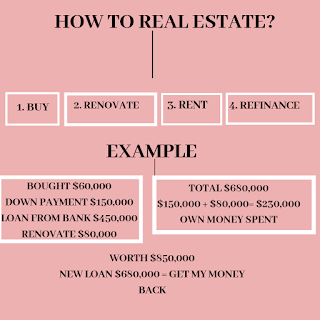Real Estate as an Investment
If your looking at real estate as an investment option then you would like to consider the following important steps. If you never considered real estate as an investment, then you might think of it after you read this. Investment can be started at an early age. Real estate is an option for a long term investment. You can start earning passive income through real estate in 7 to 10 years.
One way is to save up enough to buy a property to rent it. Which can take a very long time. Or the other way which is to leverage it (borrow debt) by a bank for which you can write-off on your taxes for benefits. Partner with other investors for more money at their own risk.
Buy: Choose a house which is very bad to look at but is located in the best area. Follow the population trends to find out how the market price is in that place. The place has to be developing with people moving in and not out. Should contain all the facilities such as hospital, school, shops, bus stop, station and so on.
- Find a right deal search for 90 days and 100 houses. If you find 1 then start looking again, compare and then choose. You can risk buying a house in an area where the population trend is low, in future it might start developing. In such place you can hold a plot and later convert it into a house for renting.
- Find a property which is nearby your location, so that you do not spend much time or money on travel to check the property. Start small and gradually go big as you experience the fruits of investing in real estate.
- Evaluate both choices whether to lease the property or to resell it. Calculate and see if the property is profitable for leasing it or reselling it. whether it is profitable to go for a residential property or a commercial property? Example: Property is bought at 150,00000 Rent 25,000 i.e 3,00000 p.a
- Rental yield= rent/property= 300000/15000000=2%Returns=2% so you give it for rent/leaseResidential <3% rent3-4% neutral>4% buyCommercial<5% rent5-7% neutral>7% buy
- Use Options to make a contract with the land owner or project developer if, the land is promising good returns in future. So you can buy at the current rate and sell it for higher rate in future by Options instrument or pre-construction purchase also called as buy off the plans.
Add value: Once you find a house for a reasonable rate in a good area, start renovating the house by repairing the damaged parts. Including things that are missing thereby, you add value to the property and give the house a new look. This will increase the price value of the house and resell the house for more.
Next step: Find the right broker, one who is an investor and knows ins and outs of real estate. Once they make a deal, do not hesitate to pay them well.
Advantages: If you start investing in real estate at an early age, i.e 20 years, you can retire early.
- You will be earning passive income thus capital gain and write-off depreciation on building for tax advantages.
- You can start real estate with debt where the banker is willing to lend money for real estate, for which the tax is zero.
- You will be earning tons of money by scaling upwards say 6 properties over a decade.
- Long investment, starts pre-small and grows over time.
Disadvantages:
- Need to look for a tenant thereby, vacancy period. Repairs for any damage informed by the tenant.
- Stay up to date with the property manager and insurance renewal. Thus requires significant upfront work.
- Repairs can be done by others for which you can write-off under tax deductions. Do not do it yourself.
- Don't need down payment more than 10-25% and the rest is debt/loan




Comments
Post a Comment